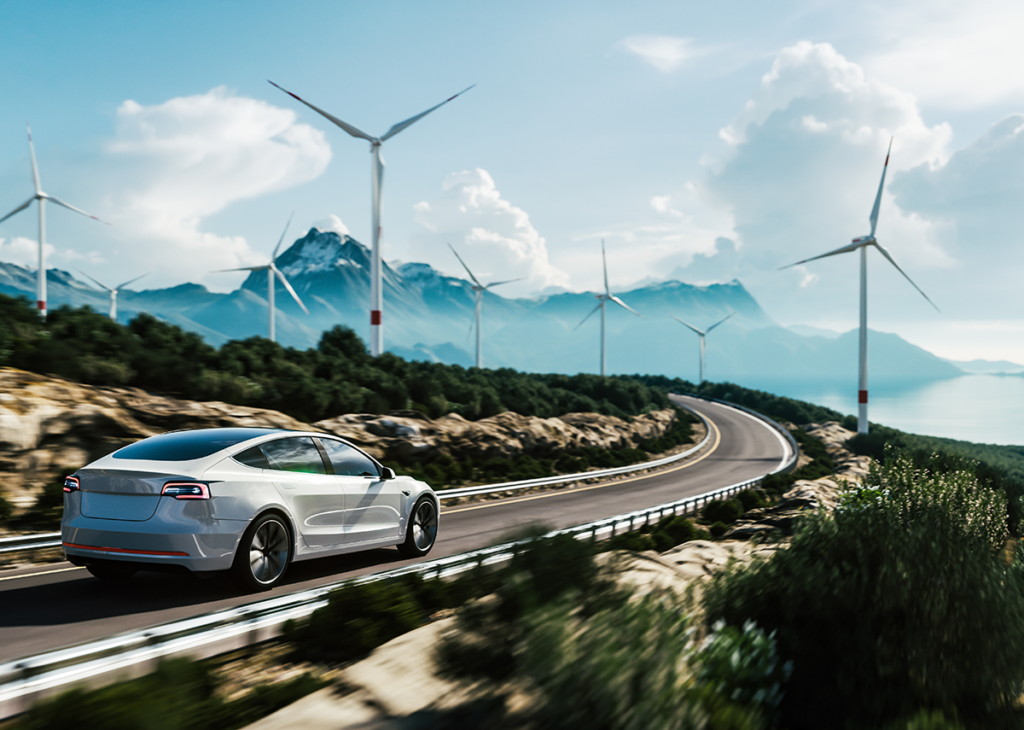The market for electric cars is growing rapidly in Europe
The number of new registrations of battery electric vehicles (BEVs) has recently increased significantly in most European Union countries. This is shown in the following graphic based on data from the European Automobile Manufacturers' Association (ACEA). Germany saw the highest number of new electric vehicle registrations in 2021, with approximately 356,000 vehicles, representing an increase of around 83 percent compared to 2020. In Italy, Sweden, and Austria, the increase even exceeded 100 percent. The graphic only shows the countries with the highest number of new registrations in 2021 – but other countries also recorded strong growth. These include Finland, Romania, and Greece.
According to the latest figures, just over one million electric cars (purely battery-powered electric cars and plug-in hybrids) are on German roads. Their share of the total number of passenger cars in Germany is thus 2.1 percent (as of October 2021). The number of electric vehicles has increased significantly in recent months. This is due to the fact that the German government recently increased the subsidy for electric cars as part of an economic stimulus package: The federal government now contributes €6,000 towards the purchase of battery-electric or fuel cell vehicles with a net list price of less than €40,000. Together with the manufacturer's subsidy of €3,000, this results in a total purchase premium of €9,000. Private individuals, companies, companies with municipal participation, foundations, corporations, and associations are eligible to apply. However, the subsidy program for electric vehicles and plug-in hybrids is currently being reformed. Therefore, from January 1, 2023, the environmental bonus will only be available for vehicles that demonstrably have a positive climate protection effect, defined exclusively by an electric driving share and a minimum electric range.
The infrastructure of fast-charging points for electric cars varies considerably across Germany. As the graphic, based on data from the German Association of the Automotive Industry (VDA), shows, in poorly equipped registration districts, sometimes more than 1,000 electric cars have to share a single fast-charging station. The Plön district has the worst infrastructure: here, there is only one fast-charging point, which all 1,455 registered electric cars there have to share. In the Calw district, there are two fast-charging stations for 2,614 electric cars – meaning there are 1,307 electric cars per fast-charging station. The best ratio of electric cars to fast-charging points is in the Altenburger Land district, with 24.6 electric cars per fast-charging point (468 electric cars and 19 fast-charging points).
English Version: Market for electric cars growing rapidly in Europe
The number of new registrations of purely battery-powered electric vehicles (BEVs) has recently increased significantly in most countries of the European Union. This is shown in the following chart based on data from the European Automobile Manufacturers Association (ACEA). Most electric cars were newly registered in Germany in 2021. At around 356,000 vehicles, the increase compared to 2020 is around 83 percent. In Italy, Sweden and Austria, the increase is even above the 100 percent mark. The chart only shows the countries with the most new registrations in 2021 – but other countries are also recording strong growth. These include Finland, Romania and Greece.
According to the latest figures, there are just over one million electric cars (purely battery-powered electric cars and plug-in hybrids) on German roads. They therefore account for 2.1 percent of the total number of passenger cars in Germany (as of October 2021). The stock has risen significantly in recent months. Background: The German government recently increased the subsidy for electric cars as part of an economic stimulus package: The federal government now adds 6,000 euros to the purchase of a battery electric or fuel cell vehicle for vehicles with a net list price of less than 40,000 euros. Together with the manufacturer's subsidy of 3,000 euros, this results in a total purchase premium of 9,000 euros. Private individuals, companies, companies with municipal participation, foundations, corporations and associations are eligible to apply. However, the subsidy for electric vehicles and plug-in hybrids is currently being reformed. As a result, from January 1, 2023, the environmental bonus will only be available for vehicles that can be shown to have a positive climate protection effect, defined exclusively by an electric driving share and a minimum electric range.
The infrastructure of fast charging points for electric cars varies significantly in Germany. As the chart based on data from the German Association of the Automotive Industry (VDA) shows, in poorly equipped registration districts, sometimes more than 1,000 electric cars have to share one fast-charging point. The lowest number is in the Plön district, where there is only one fast-charging point shared by all of the 1,455 electric cars registered there. In the Calw district, there are 2 fast-charging stations for 2,614 electric cars – so there are 1,307 electric cars for each one fast-charging station. The best ratio of electric cars to fast charging points is in the Altenburger Land district, with 24.6 electric cars per fast charging point (468 electric cars and 19 fast charging points).
Solar carport demand is also increasing thanks to environmental bonuses to promote electric cars
Promoting electromobility is seen as the key to climate-friendly mobility, which should take Germany one step further towards EU climate neutrality by 2050.
Private individuals, companies, foundations, corporations and associations can apply for the environmental bonus. Only purchases or leasing of new vehicles that were purchased and (first) registered from May 18, 2016 and remain registered to the applicant for at least six months are eligible for funding. In November 2019, as part of the concerted mobility campaign, it was decided to extend the environmental bonus until 2025 or until the total paid out amounted to 2.09 billion euros. Due to the COVID-19 pandemic, the parliamentary group leaders decided on June 3, 2020 to double the state share of the environmental bonus for electric vehicles as an innovation bonus.
In 2008, the federal government set the goal of putting one million electric vehicles on German roads by 2020 in the “National Electromobility Development Plan”. The automotive industry, which is important for the German economy, should also play a key role there and maintain and further expand its strong position in the global economy.
More about this here: Solar carport demand is also increasing thanks to the environmental bonus to promote electric cars
Adapted solar carport solutions - more electric cars = more solar carports = more challenges
More electric cars causally lead to more solar carports and more charging stations. Causality is the relationship between cause and effect. It concerns the sequence of events and states that are related to one another. Accordingly, A is the cause of the effect B if B is brought about by A. Therefore, open parking spaces are increasingly being discovered as decentralized power generators. Not only the solar requirement in some federal states, but also the growing awareness of ecology and renewable energies is sparking interest among many.
More about this here: Solar carports where there is no longer a standard - the optimal solution for every challenge with solar roofing for open parking spaces
Xpert.Digital – Konrad Wolfenstein
Xpert.Digital is a hub for industry with a focus on digitalization, mechanical engineering, logistics/intralogistics and photovoltaics.
With our 360° business development solution, we support well-known companies from new business to after sales.
Market intelligence, smarketing, marketing automation, content development, PR, mail campaigns, personalized social media and lead nurturing are part of our digital tools.
You can find out more at: www.xpert.digital – www.xpert.solar – www.xpert.plus


